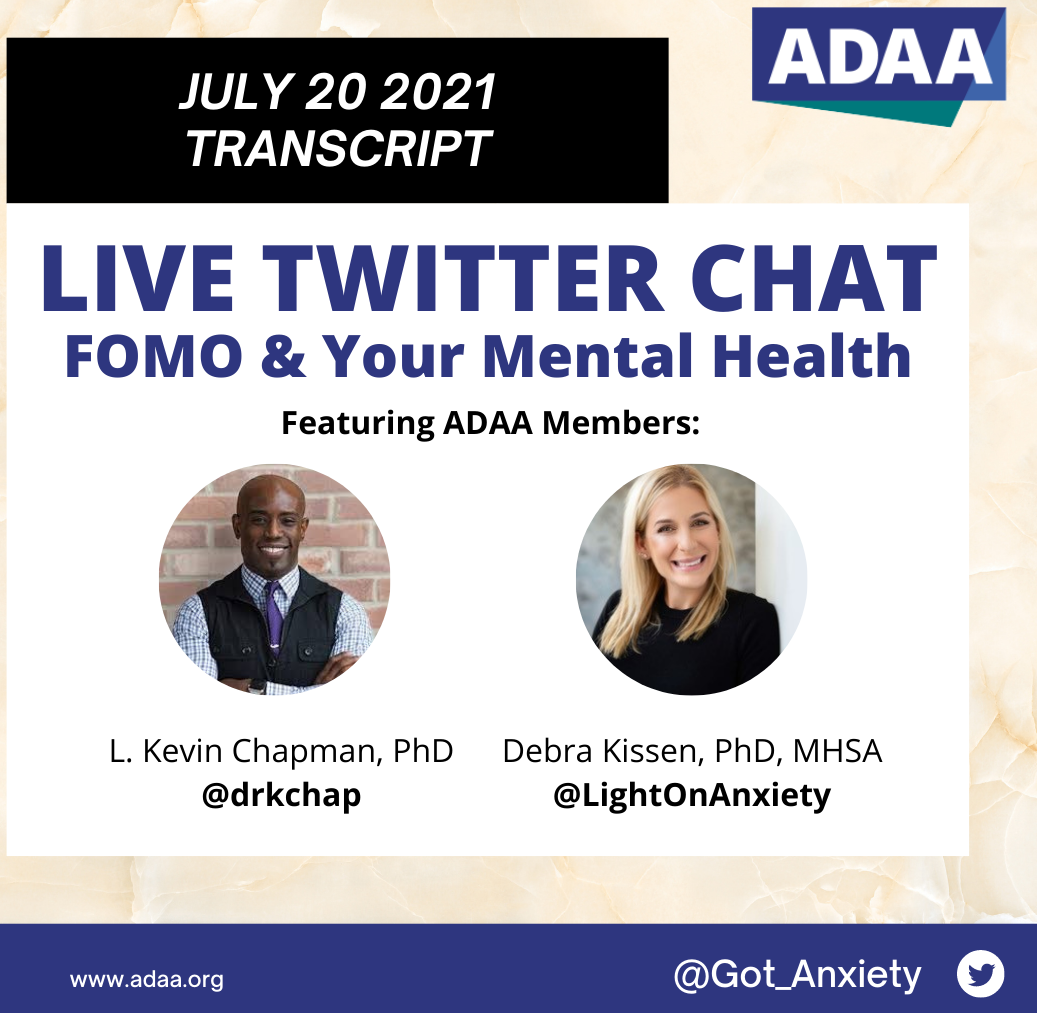FOMO & Your Mental Health Twitter Chat Transcript
FOMO & Your Mental Health Twitter Chat Transcript

Q1. Why am I experiencing FOMO?
Dr. Chapman: For starters, #FOMO is the “fear of missing out” and IS NOT a diagnosis. It is experiencing distress associated with missing out on social events for several reasons.
Dr. Kissen: FOMO is at an all-time high as we are now all re-emerging. It is easy to start engaging in unhealthy comparisons with others.
Q2. Why does FOMO make me feel so bad?
Dr. Kissen: FOMO is natural. Your brain does not want you to miss out on important events.
Dr. Chapman: Social interaction is associated with the expression of positive #emotions. As such, when #FOMO is linked to an inability to engage in social interaction, it can lead to feeling distressed. This is not abnormal.
Dr. Kissen response: Great point. Sometimes #FOMO is a sign that you should up your social engagement, other times #FOMO is just your brain making an unhealthy and unhelpful comparison.
Q3. Do you have any tips for decreasing FOMO related emotional distress?
Dr Kissen: Yes, to decrease #FOMO distress, figure out what valued living means to you, and engage in the behaviors in line with what YOU want your life to be about. The rest is just background noise.
Dr. Chapman: Being flexible in my expectations about missing out is important. Not being catastrophic in thinking about missing out will lead to much more tolerable emotional experiences (ex: “I would’ve liked to go, but I can tolerate not”)
Q4. Is it wrong that I enjoyed the decreased societal pressure on social interaction of COVID-19 and am dreading the "return to normal"?
Dr. Chapman: NOPE! Anticipatory distress (#anxiety) is normal and expected due to the uncertainty of what “normal” will look like.
Dr. Kissen: Nothing wrong with decreased socializing as long as you are choosing to live this way vs not socializing out of anxiety-fueled avoidance.
Q5: I'm nervous about re-entry, but I am experiencing FOMO seeing other people returning to normal. What can I do?
Dr. Kissen: Both states can coexist, so address one at a time. For the re-entry fear, take small but meaningful baby steps forward. For FOMO, go on a social media diet.
Dr. Chapman: Engaging in mindfulness/present-focused awareness is key, being flexible in my thoughts, and not avoiding social situations to learn that they are not “dangerous” are all important strategies.
Q6. Should I decrease my social media use if FOMO is impacting my mental health?
Dr. Chapman: Social media usage, just like many other “emotional behaviors” can have deleterious effects on my #mentalhealth if not in check. Like me and sour candy, moderation is highly advised.
Dr. Kissen: Yes!! If only that were that easy, social media is integrated into our lives. Pick the aspects of social media that are causing you the most #FOMO and set for yourself specific social media reduction goals.
Q7. What steps or techniques could I use to overcome my FOMO?
Dr. Kissen: To overcome #FOMO (Or any other stressor in your life) breakdown the challenge into specific elements. In what ways is it negatively impacting your life? And what specific solutions can you put in place to minimize the associated distress?
Dr. Chapman: Identify the thoughts associated with #FOMO and your emotions that occur. Identify and “test out” the idea that I can't enjoy myself without others. Identify and engage in regular self-care activities. Practice mindfulness strategies every day.

















